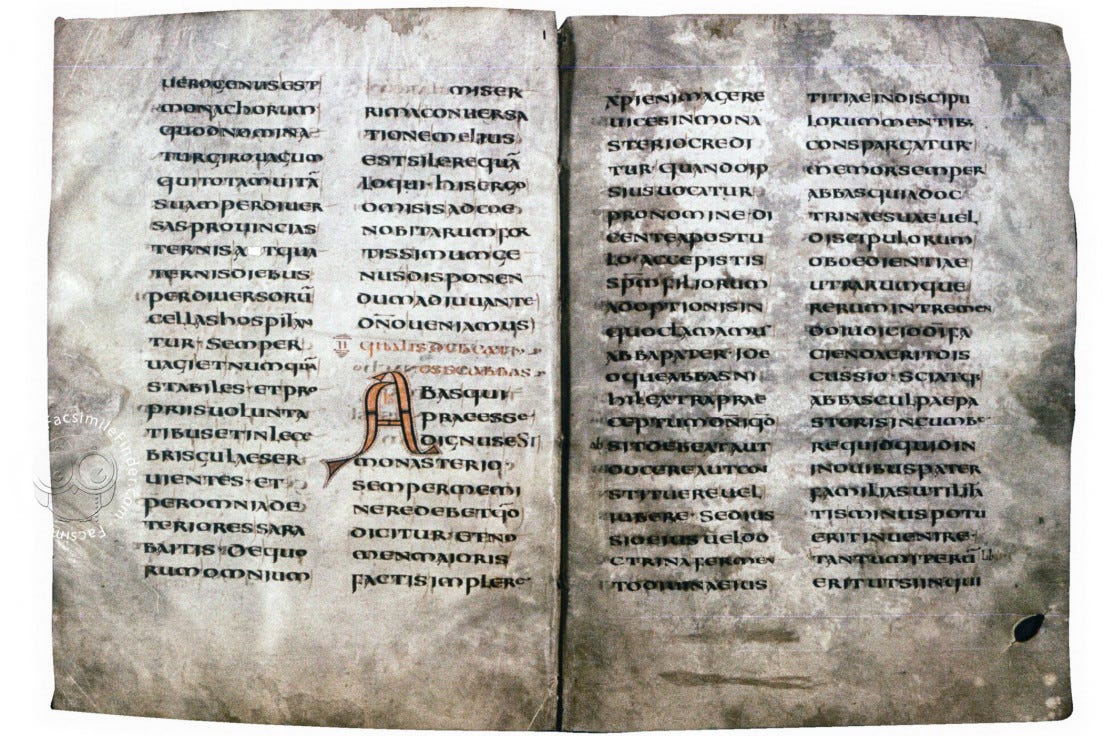Prayers of that Great Cloud of Witnesses
Benedict of Nursia: A Compendium Entry
He who labors as he prays lifts his heart to God with his hands. -Benedict of Nursia
Benedict was born in Nursia, Italy, in 480 AD. Twenty-five years later, he developed a way of life, focused on prayer, manual labor, and community living, which would guide European monks for the next millennium. It became known as Benedict’s Rule.
The only recognized authority for Benedict’s life is found in the Dialogues of St. Gregory I, who had gathered the story from Benedict’s early disciples. According to Gregory, Benedict was born into a good family. He grew up when Rome was in serious decline. During his lifetime, Rome was sacked and emptied by the Gothic king Totila. He lived through a tumutuous time.
Benedict’s character, as Gregory points out, must be discovered from his Rule, and the impression given there is of a wise and mature sanctity, authoritative but fatherly, firm but loving. It is that of a spiritual master, fitted and accustomed to rule and guide others, having himself found his peace in the acceptance of Christ. Today’s prayer has been attributed to him:
O gracious and holy God, give us diligence to seek you, wisdom to perceive you, and patience to wait for you.
Grant us, O God, a mind to meditate on you; eyes to behold you; ears to listen for your word; a heart to love you; and a life to proclaim you; through the power of the Spirit of Jesus Christ our Lord. -attributed to Benedict of Nursia
With Benedict’s Rule, emphasizing a life balance between prayer and work, prayer isn’t about length but purity of heart. Prayer combines with work as an attentiveness to God’s voice in daily life, even in mundane activities. The Rule calls for both structured times of community prayer and for this prayerful attitude to be carried into our everyday lives. Benedict taught that this would lead to a deeper level of holiness in our relationship with God.
This approach is reflected in the structure of our prayer.
It is a short prayer. Reflecting Jesus’ words in Matthew 6:7-8,1 Benedict taught that purity of heart develops through short prayers.
The prayer is for diligence, wisdom, and patience. Benedict insisted on using the entire book of the Psalms over the course of a week. The Psalms are essential in helping us to meditate on God.
How can a young person stay on the path of purity? By living according to your word. I seek you with all my heart; do not let me stray from your commands. I have hidden your word in my heart that I might not sin against you. Praise be to you, Lord; teach me your decrees. With my lips, I recount all the laws that come from your mouth. I rejoice in following your statutes as one rejoices in great riches. I meditate on your precepts and consider your ways. I delight in your decrees; I will not neglect your word.
-Psalm 119:9-16
Benedict’s Rule begins with the call to “listen... to the instructions of the Master” by turning the “ear of your heart” to God’s voice. In the same way, this prayer asks for “a mind to meditate on you; eyes to behold you; ears to listen for your word.”
Through prayer, and the obedience and humility expressed in listening to God with an open heart and renouncing one’s own will, Benedict teaches that our heart of love for God will grow. As the prayer says, “…a heart to love you.”
Finally, he believed that in our everyday lives, even ordinary and monotonous tasks have the potential to bring one closer to God, making the whole life a continuous offering. This is where the prayer ends: “…and a life to proclaim you; through the power of the Spirit of Jesus Christ our Lord.”
Matthew 6:7-8: And when you pray, do not keep on babbling like pagans, for they think they will be heard because of their many words. Do not be like them, for your Father knows what you need before you ask him.




Really like this post about Benedict - one of my favorite Saints because he is so real and basic…. Approachable